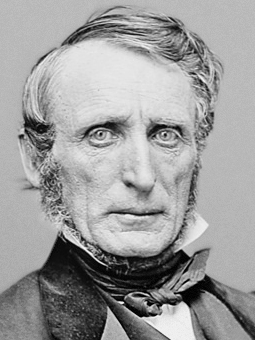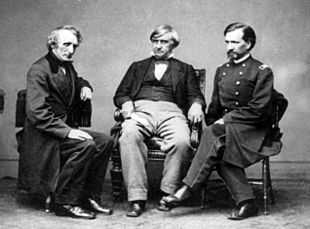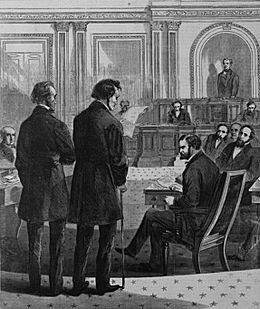John Bingham facts for kids
Quick facts for kids
John Armor Bingham
|
|
|---|---|
 |
|
| 7th United States Ambassador to Japan | |
| In office October 7, 1873 – July 2, 1885 |
|
| President | Ulysses Grant Rutherford B. Hayes James A. Garfield Chester A. Arthur Grover Cleveland |
| Preceded by | Charles E. DeLong |
| Succeeded by | Richard B. Hubbard |
| Member of the U.S. House of Representatives from Ohio |
|
| In office March 4, 1865 – March 3, 1873 |
|
| Preceded by | Joseph Worthington White |
| Succeeded by | Lorenzo Danford |
| Constituency | 16th district |
| In office March 4, 1855 – March 3, 1863 |
|
| Preceded by | Andrew Stuart |
| Succeeded by | District abolished until 1883 |
| Constituency | 21st district |
| Personal details | |
| Born | January 21, 1815 Mercer, Pennsylvania, U.S. |
| Died | March 19, 1900 (aged 85) Cadiz, Ohio, U.S. |
| Political party | Republican |
| Spouse | Amanda Bingham |
| Profession | Politician, lawyer, judge |
| Signature | |
John Armor Bingham (January 21, 1815 – March 19, 1900) was an important American politician. He served as a Republican representative for Ohio. He also became the United States ambassador to Japan.
As a congressman, Bingham played several key roles. He was a prosecutor in the trial of those who killed Abraham Lincoln. He also helped lead the effort to remove U.S. President Andrew Johnson from office. Bingham is best known for helping to write the Fourteenth Amendment to the United States Constitution. This important amendment changed the U.S. Constitution.
Contents
Early Life and Education
John Bingham was born in Mercer County, Pennsylvania. His father, Hugh, was a carpenter and bricklayer. John went to local public schools. After his mother died in 1827, he moved to Ohio to live with his uncle Thomas.
He worked for two years as a printer. He helped publish a newspaper called the Luminary. Later, he went back to Pennsylvania to study at Mercer College. He then studied law at Franklin College in New Athens, Ohio. There, he became good friends with Titus Basfield. Titus was the first African-American to graduate from college in Ohio.
John's father and uncle were both against slavery. They were active in local politics. His family's strong beliefs against slavery influenced him.
Becoming a Lawyer and Politician
After finishing his studies, Bingham became a lawyer in 1840. He started his law and political career in Cadiz, Ohio. He was a member of the Whig Party. He helped campaign for President William Henry Harrison.
In 1846, Bingham won his first election. He became the district attorney for Tuscarawas County. He served in this role until 1849.
Serving in Congress
Bingham's political work continued even as the Whig Party became less powerful. He was elected to the 34th Congress in 1855. He represented Ohio's 21st district. In Washington, D.C., he lived with Joshua Giddings, another important politician who was against slavery.
Voters reelected Bingham several times as a Republican. He served in the 35th, 36th, and 37th Congresses.
Supporting the Union in the Civil War
During the Civil War, Bingham strongly supported the Union. He was known as a Radical Republican. President Abraham Lincoln made him a Judge Advocate for the Union Army. This meant he helped with military legal cases.
Bingham was a prosecutor in three important military trials. He worked on the trials of General Fitz John Porter and Surgeon General William Hammond. He also played a key role in the trial of the people involved in Lincoln's assassination.
Key Moments in Congress
Bingham was reelected to Congress in 1865. He began serving in the 39th Congress on March 4, 1865.
Lincoln Assassination Trial

A month later, President Abraham Lincoln was assassinated. His Secretary of State, William H. Seward, was also badly hurt. The main person responsible, John Wilkes Booth, died soon after.
John Bingham was asked to be a prosecutor for the trial of the people who helped Booth. He worked with General Henry Burnett and Joseph Holt. The trial began on May 10, 1865.
Eight people were accused of being part of the plot. On June 29, 1865, all eight were found guilty. Four of them were sentenced to hang. These included George Atzerodt, David Herold, Lewis Powell, and Mary Surratt. They were executed on July 7, 1865. Mary Surratt was the first woman in American history to be executed.
Creating the Fourteenth Amendment
In 1866, Bingham helped create a very important part of the U.S. Constitution. He was part of a committee working on changes to the Constitution. Bingham wrote a key part of what became the Fourteenth Amendment to the United States Constitution.
His words became Section 1 of the amendment. It says: "No State shall make or enforce any law which shall abridge the privileges or immunities of citizens of the United States; nor shall any State deprive any person of life, liberty, or property without due process of law, nor deny to any person within its jurisdiction the equal protection of the laws."
This means states cannot take away the rights of U.S. citizens. They must treat everyone fairly under the law. This amendment was approved in 1868. It has greatly expanded civil rights protections in America. It is one of the most cited amendments in legal cases.
Impeachment of Andrew Johnson

Bingham continued to serve in Congress. He played a big part in the effort to remove President Andrew Johnson from office. This process is called impeachment.
At first, Bingham was against impeaching Johnson without enough evidence. But on February 24, 1868, he voted to impeach Johnson. The House of Representatives then chose Bingham to be one of the prosecutors in Johnson's impeachment trial.
Losing Reelection
In 1872, Bingham lost his bid for reelection. He was involved in a political scandal at the time. Another candidate, Lorenzo Danford, was chosen instead.
Ambassador to Japan
After leaving Congress, President Ulysses Grant appointed Bingham as the U.S. Minister to Japan. This was like being an ambassador. Bingham served in Japan for a long time, from 1873 to 1885. He served under four different presidents.
Bingham worked hard to improve relations between the U.S. and Japan. He fought against unfair treaties that other Western countries had forced on Japan. These treaties gave Westerners special rights and control over Japan's trade. Bingham helped Japan regain more control over its own laws and taxes. He also respected Japanese culture.
Later Life and Legacy
After returning from Japan, Bingham remained active in politics. He died in Cadiz, Ohio, on March 19, 1900. He was buried next to his wife, Amanda.
In 1901, a bronze statue honoring John Bingham was put up in Cadiz, Ohio. His former home in Mercer County, Pennsylvania, is now the local Republican headquarters.
 | William Lucy |
 | Charles Hayes |
 | Cleveland Robinson |

